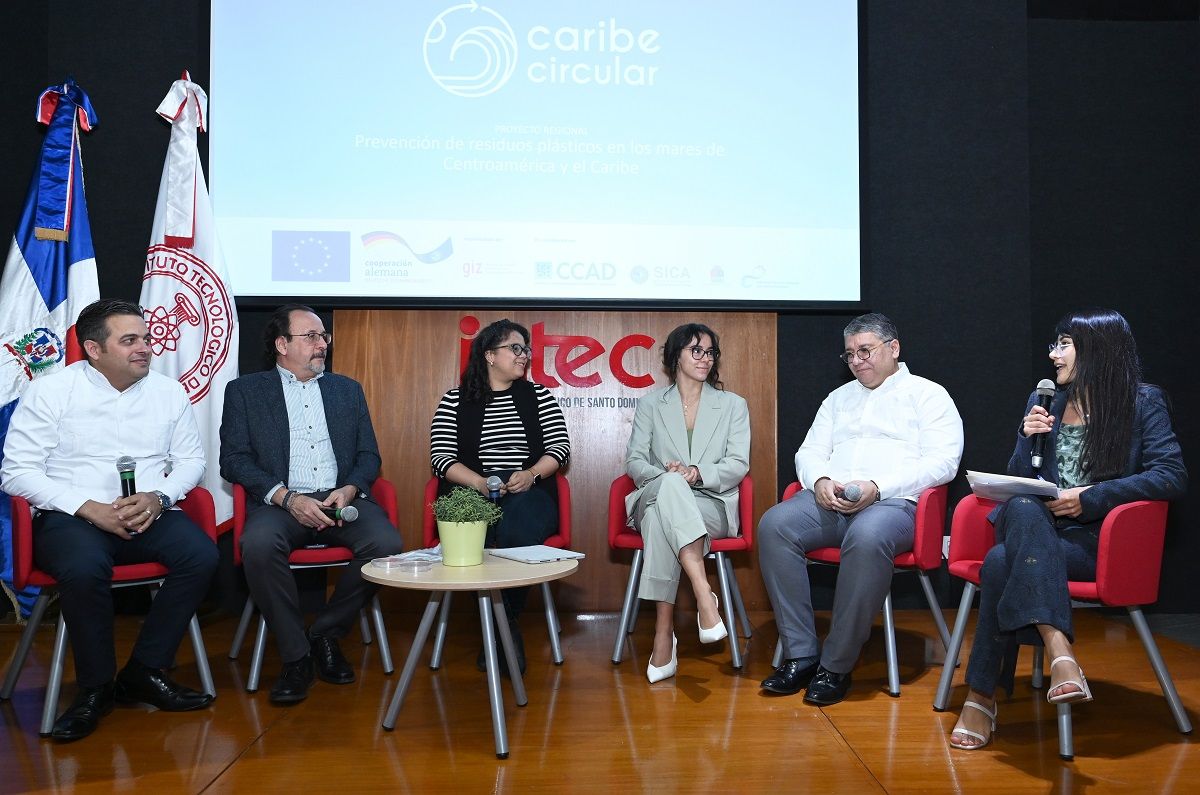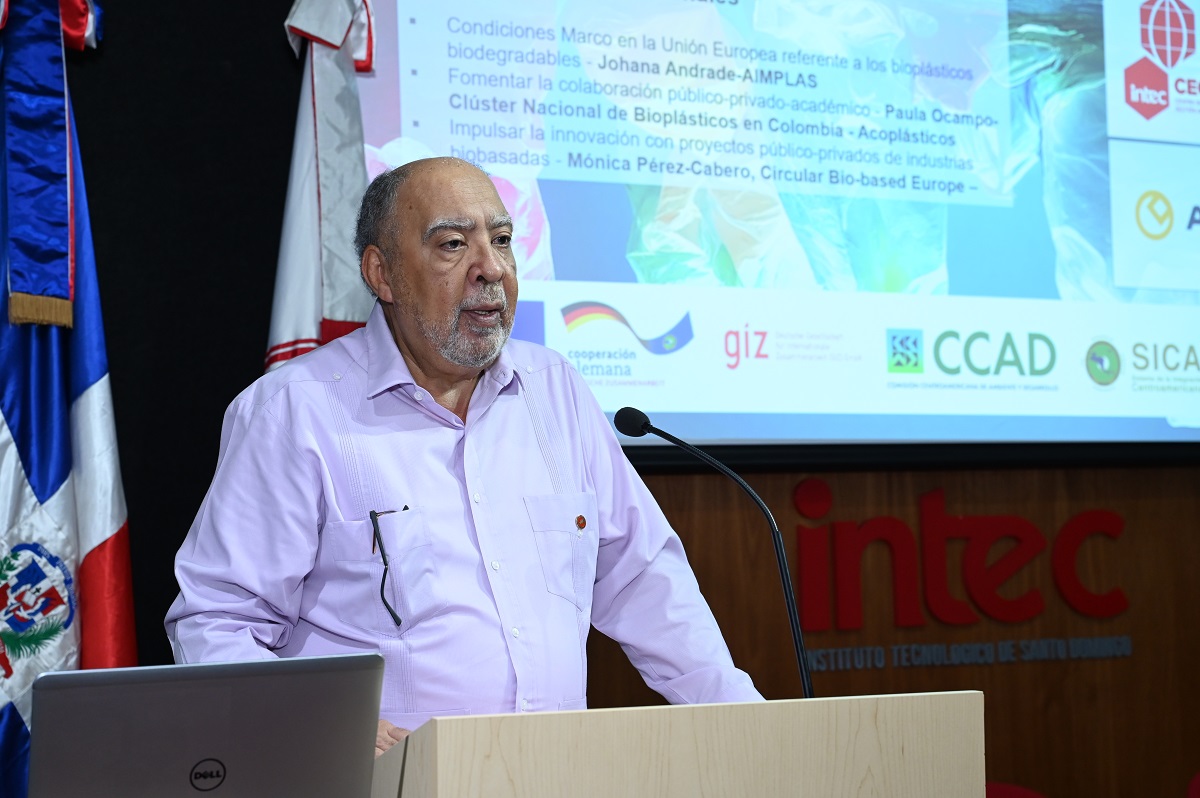
Categories:
Publication date:
Dominican Republic: a powerhouse in the development of biomaterials and bio-based, biodegradable and compostable plastics
SANTO DOMINGO.- Bio-based, biodegradable and compostable plastics and compounds, known as bioplastics, are part of the transition strategies towards a sustainable and truly circular economy, as well as the fight against pollution caused by inadequate waste management. plastic waste and dependence on fossil sources.
This was stated by relevant actors from the political, business, technological, environmental and academic sectors, nationally and internationally, in a meeting held in the Instituto Tecnológico de Santo Domingo (INTEC) to address the issue of sustainable plastics, with the purpose of fostering collaboration, sharing knowledge and providing a comprehensive perspective on the development of these sustainable products for more efficient uses.
The event was supported by the “Circular Caribbean” project, financed by the Federal Ministry of Cooperation and Development (BMZ) of Germany and the European Union (EU). The Environmental Management Center (CEGA) and the Bioplastics and Biomaterials Innovation Unit, both from INTEC, were part of it; the Delegation of the European Union, the Ministry of the Environment, the Association of Industries of the Dominican Republic (AIRD) and the Technological Institute of Plastics (AIMPLAS).
The day was inaugurated by Julio Sánchez Mariñez, rector of INTEC, who highlighted the institutional role in generating lines of action, deeply committed to the environment and society, in line with the regional development objectives for the benefit of the present generations. and future. “INTEC has been, is and will continue to be a fundamental actor in everything that is the preservation of our environment, the preservation of our cultural capital and social capital for the benefit of present generations and especially of generations to come. ", said.
In addition, he called for the strengthening of alliances between the industrial, academic and government sectors, whose previous collaborations have left a positive mark on the country. With these words, he gave way to the interventions of Melvin Asin, head of cooperation of the Delegation of the European Union; Yvelisse Pérez, coordinator of Solid Waste of the Ministry of the Environment, and Mario Pujols, vice president of the Association of Industries of the Dominican Republic (AIRD). All of them underlined the importance of this event in the context of both regional and global policies.

The activity presented the progress of the Bioplastics and Biomaterials Innovation Unit of INTEC, created at the end of 2023 for the management of solid waste in the country. Experts Yaset Rodríguez and Jessica Feliz presented the creation of materials from coconut fiber, sargassum, starches and the creation of bioplastic from bananas and coconut fibers, focusing on biodegradable elements that do not represent toxicity to the environment.
Likewise, they announced that they will work on the planning of postgraduate and technical and professional training programs in the management of bioplastics, and that they will inaugurate a Plastics Laboratory for the development of the Unit's own research, carried out in collaboration with students.
“Demand is what allows us to find which products need to be developed and scaled,” specified Luis Toirac, professor in the Engineering Area and collaborator on the project, a comment with which Eva Verdejo, researcher in the Biodegradation and Compostability Group, agreed. of AIMPLAS of the Technological Institute of Plastics-Valencia, Spain, when addressing the importance of creating sustainable and sustainable products for the market they are aimed at.
The block led by Johana Andrade, AIMPLAS researcher in the area of biodegradation and compostability, also had the participation of Elena Martínez and Horacio Lomba, representatives of the Dominican industrial sector, who highlighted the joint work that has been carried out with INTEC and showed their interest in the continuity of this strategic collaboration within the framework of the valorization of agroindustrial by-products or sargassum biomass.
The event also included the results of the consultancy “Analysis of opportunities and challenges in the development of biobased, biodegradable and compostable plastics in the country”, carried out by AIMPLAS, in which Verdejo presented the opportunities that exist to deploy the creation of new products , including packaging and elements created from rice husks, coconut fiber and sargassum.
In the case of sargassum, it has applications in bioplastics, agriculture, human and animal food, pharmacy and parapharmacy, among others. Elena Martínez, research director of SOS Carbon, stated that 35 million of this macroalgae are produced in the world, of which 3.5 tons are produced in the Dominican Republic (10%).
In turn, the discussions “Defining framework conditions in the European Union” by Johana Andrade, from AIMPLAS; “Foster public-private-academic collaboration - National Bioplastics Cluster in Colombia” by Paula Ocampo from the Colombian company Acoplásticas; “Boosting innovation with public-private projects in biobased industries” by Mónica Pérez-Cabero, from Circular Bio-based Europe – CBE; and “Technological Innovation - 4 Business Examples”, including Thermoplastic Starches, presented by Rosa Puig, Marketing Manager at Novamont; Green Polyethylene, by Martin David Rangel of Clemesha Braskem; and Plastics from algae components, by Eduardo Rodriguez from One·five.
Plastics at national and international level
According to the activity, the global production capacity of bioplastics is expected to increase significantly, going from about 2,18 million tons in 2023 to approximately 7,43 million tons in 2028, according to estimates by European Bioplastics.
In his speech, Asin reflected on the role of solid waste management and the commitment of the EU and its Member States to contribute to the solution of this problem.
“We have a problem, as approximately one million plastic bottles are purchased every minute globally, and up to five trillion plastic sleeves are used each year. Half of plastics were produced in the last 15 years. “Almost eight million tons of plastics reach the seas, 5 bags of garbage on every foot of the coastline around the world.”
While Yvelisse Pérez recalled that "the Dominican Republic generates around 398,000 tons of plastic containers and packaging, of which only 22% is managed, and only 8% of all plastics is recovered."
The meeting included the participation of Mario Pujols, vice president of AIRD, who expressed that "INTEC involved gives us the certainty that what has been discussed here will help us to delve deeper into this important topic and take away knowledge."
